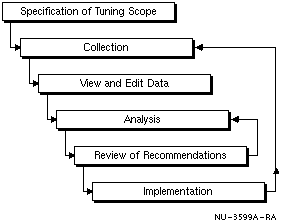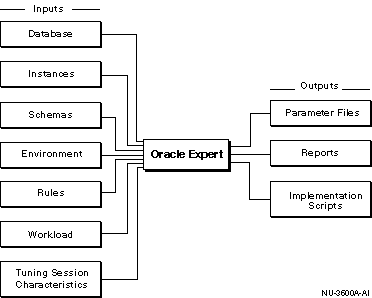Release 9.0.1
Part Number A86647-01
Home |
Book List |
Contents |
Index |
 Master Index |
 Feedback |
| Oracle Enterprise Manager Database Tuning with the Oracle Tuning Pack Release 9.0.1 Part Number A86647-01 |
|
Oracle Expert performs tuning by following a designed methodology.
The topics in this chapter include:
The Oracle Expert methodology includes the following steps (see Figure 10-1).

When you set the scope of a new tuning session, you are telling Oracle Expert exactly what you want to tune. You can create a focused tuning session by initially selecting one or two categories. You can also create a comprehensive tuning session by selecting all of the scopes, but this may take a considerable amount of time.
Your choices can be one or more of the following:
Use this option to confirm that your instance parameter settings are appropriate and contention is not a problem.
Use this option to confirm SQL is being shared as appropriate.
Use this option to evaluate database space management issues such as sizing and placement.
Use this option to optimize index usage on your database tables or to check for indexes that should be rebuilt.
Oracle Expert collects the following classes of data as appropriate for the specified tuning scopes:
Oracle Expert allows you to maintain a SQL History for your service (database). The SQL History can store SQL cache, Oracle Trace, or .XDL file data. The SQL History is shared among other Oracle Tuning Pack applications and tuning sessions. With the SQL History, the user can build up the complete set of SQL statements that are executed within the database environment and share the statements with multiple tuning sessions. By sharing the SQL history, you do not have to recollect statements for each tuning session. You can merge to the SQL history (building a complete set of SQL statements executing in the database environment) or you can replace an existing SQL History with a new one. Each service, however, can only have one SQL History at a time.
Once you have collected the various pieces of tuning data, you can view and edit that data. The data is organized as follows:
You have the option of editing both the attributes and the rules for this data. Attribute information is the actual data collected by the product. This data can be can be edited for "what if" tuning. You should change any dependent attributes for the evaluation to provide the best recommendations. The rules can also be changed. Rule adjustments allow you to influence Oracle Expert's evaluation process.
Once you have collected and edited the data as needed, you can have Oracle Expert perform the analysis to generate tuning recommendations.
During the analysis, Oracle Expert evaluates the collected data in conjunction with all its rules and provides optimal performance tuning recommendations.
Once Oracle Expert has analyzed the data, you can review the recommendations and decide which to accept.
For example, assume that Oracle Expert recommends that you increase the shared_pool_size parameter from 300,000 bytes to 500,000 bytes. If you choose not to use this recommendation, you can decline the recommendation and analyze the data again. Oracle Expert keeps track of the recommendations you have accepted and takes into account interdependencies among the collected data before generating new recommendations.
When you are ready to implement the Oracle Expert recommendations, you can use Oracle Expert to create parameter files and implementation scripts. These files and scripts allow you to implement the Oracle Expert recommendations at your convenience. These files and scripts minimize the risk of introducing any new problems during implementation, and they reduce the level of expertise required to implement the recommendations.
Oracle Expert takes collected input, processes this input through various rules and algorithms, and creates recommendations, tuning scripts, and reports.

Oracle Expert uses the following input data to generate effective tuning recommendations:
The Database class data contains database-wide attributes of the database, such as the database name and version, users, tablespaces, and public synonyms.
The Instance class data refers to the instance parameters and instance statistics information [collected by Oracle Expert not necessarily collected from V$ tables.]
The Schema class data refers to the tables, indexes, clusters, views, and constraints information collected by Oracle Expert.
The Environment class data refers to the physical hardware resources available to the database; for example, and system data (which includes memory and CPU information).
Workload class data refers to the nature, frequency, and importance of SQL requests that access the database.
Rules are pieces of knowledge used by Oracle Expert to analyze collected data for a tuning session. By changing rule values, you influence the tuning recommendations made by Oracle Expert.
Tuning Session characteristics provide Oracle Expert with a higher level of guidance about how the database is used. This is data that cannot be collected directly from the database. For example, the Oracle Server has specific features that are designed to optimize performance in a data warehouse environment. If you set Application Type to Data Warehousing, Oracle Expert knows that these features are applicable. Downtime Tolerance allows the user to influence whether the system will bias its recommendations for recovery or performance.
With inputs such as database, instance, schema, environment, workload, and rules, Oracle Expert generates the output needed for solving database performance problems. Oracle Expert generates the following:
Oracle Expert generates the Analysis, Session Data, and Recommendation Summary reports and Workload Cross Reference.
Describes the tuning recommendations made by Oracle Expert. This report provides a detailed explanation of what Oracle Expert evaluated, how Oracle Expert interpreted the collected data and why, and any risks involved in implementing the recommendations.
Provides summary database information. It also provides detailed information about instances, database users, tablespaces, schemas, environment, workload, and rules.
Describes, in a concise form, the recommendations made by Oracle Expert. This report is a summary of the Analysis report.
Provides information on tables and related requests. The report is organized by table name and by request name so that you can quickly find the information you need. This report can show you if your current Oracle Expert workload is complete.
In addition to the reports, Oracle Expert generates files to help you implement its recommendations. These files include:
Contains SQL for implementing schema objects, tablespaces and database users. Some recommendations, such as table relocation to a new tablespace, are described textually and performed by the DBA.
Contains instance parameter values that Oracle Expert recommends for improving the performance of a particular instance. Oracle Expert generates these subsets, which you can merge into the existing INIT.ORA file for the instance.
|
 Copyright © 1996-2001, Oracle Corporation. All Rights Reserved. |
|